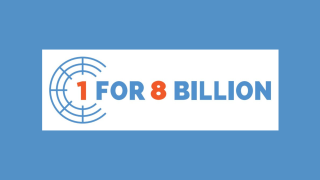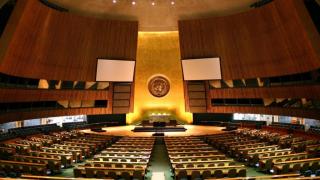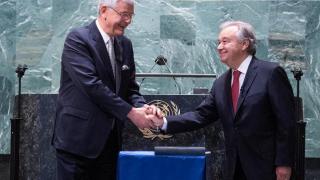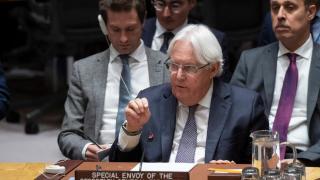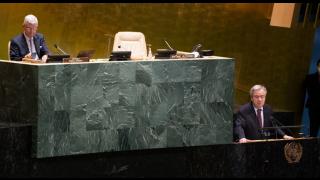
Ahead of the third round of Security Council 'straw polls' on 29 August, UNA-UK's Executive Director, Natalie Samarasinghe, was interviewed by the International Business Times about the Council's closed-door deliberations on who should succeed Ban Ki-moon as UN Secretary-General.
As co-founder of the 1 for 7 Billion campaign, UNA-UK has been pushing for a more open, inclusive process to appoint the next UN leader. While the recent public debates with candidates have been a major step forward, concerns have been raised that the Security Council's secretive 'straw polls' run contrary to this new spirit of transparency.
Read the article or read the full interview below
1) The first two secret ballots by the Security Council have taken place, are you happy with how they have proceeded?
UNA-UK's 1 for 7 Billion campaign has consistently called for the selection process to be conducted in a structured fashion, leaving as much as time as possible for the successful candidate to prepare for what is often called the most impossible job in the world. So it's good that two straw polls have taken place and that at least one more is expected later this month.
It is also positive that all candidates under consideration have come through the formal process put in place by the General Assembly last year - a far, and sorely-needed, cry from the days when the wider UN membership sometimes didn't even know who was in the running. And it's interesting that the candidate who has topped both polls is not from the expected regional group. We hope this signals a permanent shift towards merit as the primary consideration in senior UN appointments.
But there is still a long way to go. New candidates could emerge (if they do they should go through the same process as others have); more will drop out. And things will change when the P5 red ballots come out. New Zealand's decision to hand over responsibility for the polls to Russia in September, to avoid any perception of conflict of interest during their presidency of the Council, could see the process speed up - as Russia is keen to preside over the decision. But it could also slow things down, especially if their preferred candidate is not doing well.
2) Is the Security Council honouring the spirit of a more open contest?
The new selection process was approved by all UN member states, including the P5, albeit with varying degrees of enthusiasm for transparency. After all, it was an opportunity for them to demonstrate that they could accept some reforms without actually giving away power. Several Council members, particularly non-permanent members but also the UK, were active supporters of more openness, and almost all participated in the General Assembly dialogues with candidates.
However, now that the action has moved from Assembly to Council, certain states - notably Russia - are keen to reassert control and go back to business as usual. This is a real shame. There is a host of steps, from regular public briefings to private meetings with regional groups, that the Council could have taken to show that it respects the strength of feeling on this issue within the UN membership.
The attempt to keep poll results secret makes the Council seem stubborn and out of touch. While I believe that a certain degree of confidentiality is desirable in what is still a recruitment process and not an election, it would have been far better for the Security Council to issue a formal statement rather than fuel the rumour mill. And this is not, after all, just an internal HR process. This is a matter of global public concern.
3) There is criticism that despite the number of inspiring women candidates, they still do not appear to be at the forefront of the latest results. Is this fair?
It was certainly disappointing to see highly experienced women not do as well as men with much less experience. I do think, however, that some of the criticism stems from the sadly misplaced hope that the Council's view of what makes a good UN chief matches that of civil society. I wouldn't have thought that "inspiring" is the foremost quality sought by certain P5 states.
That said, some of the candidates who did well are clearly qualified. I would love to see a woman on the 38th floor – what a fantastic symbol for women and girls around the world. But the UN needs more than a symbol. We should be pushing for the best possible person. It would be an insult to any candidate – especially the women – to suggest the Secretary-General be appointed for any other reason.
4) You said that it would be harder for an unpopular candidate to be sprung on the General Assembly, but are you concerned this could still happen?
While this year's process is more open, it is still in the hands of the Security Council, and within it the P5. Until we revert to the selection process that was originally envisaged – a ballot in the General Assembly with more than one name on the ticket – any of the P5 could block a candidate they don't like. It is harder for a P5 state to push through an unpopular candidate. Doing so would require support from the non-permanent members, as well as no objections from the other permanent members.
It is, of course, possible that the Council ends up putting forward a compromise candidate to the Assembly. I still believe, though, that the improved selection process would significantly raise the cost of them backing someone who is actually unpopular or seen to be far less qualified than the other candidates. So we might not get the best, we might get someone bland, but we won't get the worst. And I think the P5 recognise the need for someone competent to head the UN at this turbulent time. After all, it's in their interests to preserve the international system that, at present at least, gives them what many feel is disproportionate power.
This interview was conducted via email by Brendan Cole, Night Editor, International Business Times UK

